As I write this post, I’m sitting in a lovely little cafe in Oxford. Over my shoulder, I can hear a young couple chatting about religious experiences, deliberating if they’d like to have one. I have the book The Mystical Theology of Saint Bernard sitting next to my coffee. One woman walks by me, pointing to it and saying, “Oh my!” The waiter casually asks me what I’m studying in light of reading this book. He tells me about his own orientation towards Sufism, or Islamic mysticism. We compare notes.
I remember arriving in the UK, now over two years ago, geared with the mindset of entering into a post-Christian and post-religious context, where dialogue about God or spirituality would be sparse or nervously whispered. We spent our first six months in London before moving up to Oxford. As my husband and I hopped on double-decker buses to navigate the city, desperately trying to find a flat to rent, we were continually surprised by the chatter around us—overhearing teenagers debating Christianity and Islam or other people generally talking about Mormonism or spirituality. To us, the city seemed unexpectedly alive with religious conversations. These rumblings set me on a quest to understand—sociologically and spiritually—what I’m experiencing on a daily basis.
Below, I’ve compiled a list of some of the most intriguing religious trends that have been scribbled down in my notebook while attending events in London and Oxford over the last few months. Throughout these occasions, I’ve gotten to meet so many of my heroes: the writers and thinkers actively forming my neural pathways.
“Happy clappy” and “smells and bells” churches are growing the fastest.
As
put it at the recent Theos Annual Lecture: Does the future have a church?, “People want to feel something”. The other panellists discussed how the very high (traditional) churches and the very low (charismatic) churches seem to be doing best as far as institutional attendance, but many in the middle seem to be “hollowing out”. More specifically, we are seeing interesting phenomena like a massive spike in young men attracted to more traditional forms of religion, like Eastern Orthodoxy or Roman Catholicism (explored more below). Furthermore, low-church Pentecostalism is sweeping across Africa and migrant communities in Western countries. Far from this being a shallow desire for people to just experience an emotional high, there’s something wise and intuitive about this more experiential and visceral search for God, one that is getting at the gaps of contemporary Evangelicalism and mainline Protestantism. “While some traditional denominations continue to face challenges, we’ve seen significant, broad-based growth among most expressions of Church – particularly in Roman Catholicism and Pentecostalism. There are now over 2 million more people attending church than there were six years ago.” - The Quiet RevivalMigration is reinvigorating the church in the West.
While the institutional Church of England has been declining in attendance and membership, other pockets of the Christian faith are surging in places like London. At the recent Theos event, one of the speakers stated that “London has become much godlier since the turn of the millennium by way of migration.” Anecdotally, you can read more in this piece: Thank God for immigration. It’s reviving our dead churches. Religious migrants might just be a part of holding back the tide of secularisation: “But curiously, any growth that we do see in the British Church is largely found in areas where immigrants live and, more specifically, those of West African origin. Since 1979, there has been a 50 per cent rise in the number of churches in London.”
Gen Z’s spiritual openness gets data behind it.
For a while, the suspicion that something spiritual was stirring seemed supported only by one datapoint: the rise of the “nones”—those who check “none” when asked their religious affiliation—had finally plateaued. But now, new data indicates something more: church attendance is actually rising, especially among Gen Z, and even more so among young men. The Quiet Revival Report by the Bible Society is making waves and has been a striking confirmation of Justin Brierley’s thesis. Here’s a helpful article on the new report by Seen & Unseen.
“The report identifies a general increase of people who go to church at least once a month and call themselves a Christian from 8 to 12 per cent. It presents a radical shift among young adults between 18-24, all within the Generation Z cohort, as being more likely to fit this definition of churchgoers than any generation except for those over 65. In a further reversal of norms, the research sees men as more likely to attend church than women across most ages, but especially among under-35s. Critically the report outlines that this is ‘not a case of young men joining while young women are leaving’, but of mutual increase in church attendance.”
Good news! The people are craving beauty, art, & great books.
Through Inkwell happenings, our editorial team has been meeting up over pints and meals with contacts who are in Oxford or passing through. People like academic and author,
, and Executive Director of the Rabbit Room, Dave Bruno, who have helpful insights of the Christian literary ecosystem. The main takeaway: Beauty and the arts are moving from being more fringe and optional to being the source of great longing, curiosity, and traction in many Christian circles. Goodbye utilitarianism, hello to beauty and good books that will thicken our faiths and invite others in. I especially loved this article on the Christian writing scene by .
The left and the right seem to have different entry points into faith.
Within the trend of increased openness to religious belief, those with more conservative orientations seem to be quite intrigued by the civilizational benefits or structures that Christianity provides. Some of these people have self-identified as “religious and not spiritual” and are more interested in Christianity on a societal level (see pictures below). This was a tension especially present at the ARC conference, which prompted this article I wrote for TGC called The Constantine Question and Christianity’s Future in the West. Meanwhile, on the left, there seems to be a kind of interest in religion due to a general anxiety and bewilderment with our current times, as well as an openness to spirituality. These people often fall into the more “spiritual and not religious” crowd that values Christianity on a more individual level. In a conversation with a friend last month, she mentioned that several of her high school friends had become Christians through using psychedelics and encountering the person of Jesus on their trips. These are strange times. While God seems to be moving on both sides of the political spectrum, these are crude categorisations of entry points that seem to be resonating on both sides. At the heart of each audience’s motivation is a search for an awe-filled story that can order their days and our collective cultures.

David Brooks interviewing two of Civilizational Christianity’s biggest proponents: Ayaan Hirsi Ali & Douglas Murray 6. It’s time to do the work of re-enchantment
for a great demonstration of this).
At the ARC conference, I briefly got to meet Jonathan Pageau. I asked him what the next phase of the re-enchantment conversation must be. He simply said it is now time to actually do the labour of re-enchanting. We need to move beyond repeatedly diagnosing modern disenchantment and merely listening to podcasts on how to re-enchant our worldview. Now is the time to actually immerse ourselves in the images of the bible and in ancient myths, to embrace storytelling and age-old Christian narratives (follow
Seekers want the demanding and the strange.
You might be hearing the term “weird” being thrown around incessantly in Christian circles. After years of evangelicalism trying to people please to the culture, there’s a call for the church to be less insecure and more confident in being its strange self. If people are craving something ‘other worldly’, all we have to do is bring out the sacraments and dig into our biblical stories. This might be a part of the allure of many young men and people in general to the Orthodox church, which has maintained its mysterious liturgies and traditions. Again, Orthodox writers like Jonathan Pageua,
, and are doing a fabulous job of embracing the Christian myth, imagination, and story—trying to remind us that Christianity appeals to something deeper than our reason, its peculiar beauties are a compelling welcome to those outside the church. The Orthodox church also has a very high barrier to entry. Interested individuals, once finally advised by the priests that they are ready, go through a year-long process called ‘catechumenate’ to prepare them for baptism and confirmation. Ironically, this ‘high demand’ and effort required seems to also be an appeal to young men in the midst of the male identity crisis. If a kind of liberal watery low-ask Christianity is weak tea, these folks are after a kind of strong wine and hearty meat faith.Mysticism can trend, but it should involve sacrifice.
Rod Dreher, a highly complicated public figure who wrote Living in Wonder, speaks regularly on re-enchantment. Here’s one of the things I have down in my notes that Rod accentuated at the Oxford Literary Festival: “People want strange, but an experience of wonder is useless unless it demands something of you.” This is one way to distinguish Christian mysticism from the forms of new age spirituality that are currently trending.
Catholics are transmitting their religion more effectively to the next generation than protestants.
My master’s supervisor always talked about the “stickiness” of religious traditions, asking what compelling ingredients make some religions or denominations have both more lifelong adherence and transfer to the next generation. Check out the graphs in this post, and you’ll see how protestants have bled out significant numbers each generation. Catholics have done a better job on this, and it’s worth a good, long, reflective look in the mirror on this one.
The UK & US religious environments are different but connected.
When I mentioned my observation about religious conversations around London to one of the pastors, he argued that here in England, Christians have not had cultural or political clout for the last 50 years. When people look around, ready to point fingers and blame someone for the state of society, Christians are off the hook. This seems to be working to the advantage of Christians in the UK, where people have less baggage with the church and may be more willing to try it out. In the US, the Evangelical right and its more upfront political alignments sometimes mean there are ongoing culture war connotations with Christianity. So while UK trends can’t be directly mapped onto the US because they have quite different societal DNA, many of them are still manifesting similarly in countries across the Western world.
The Church continues to become a compelling institution (despite setbacks).
Whenever people bemoan how difficult it is to meet someone these days, with people relying heavily on having to meet complete strangers on dating apps, I always jokingly throw in that the church is a phenomenal place to find a spouse. The sheer fact of someone attending church does screen out a large number of bad actors. For meeting people in a new city, how does one find like-minded friends with similar values and interests? The church is actually a pretty logical way to do this, building in shared activities and moments of emotional connection throughout your week. While church scandals in the US and the UK certainly mean that trust in organised Christianity waxes and wanes, I’m continually compelled—on a relational and sociological level—that the church is an especially important institution during the loneliness epidemic. From the Theos lecture, a panellist said, “The church is the world’s largest source of social capital—mainly in unsung ways.” There’s a durable and supernatural power to the institution of the Body of Christ. As Hilaire Belloc said, “The Church is a perpetually defeated thing that always outlives her conquerors.”
Drinking in all the oddities and beauties around me.
Warmly,
Carolyn






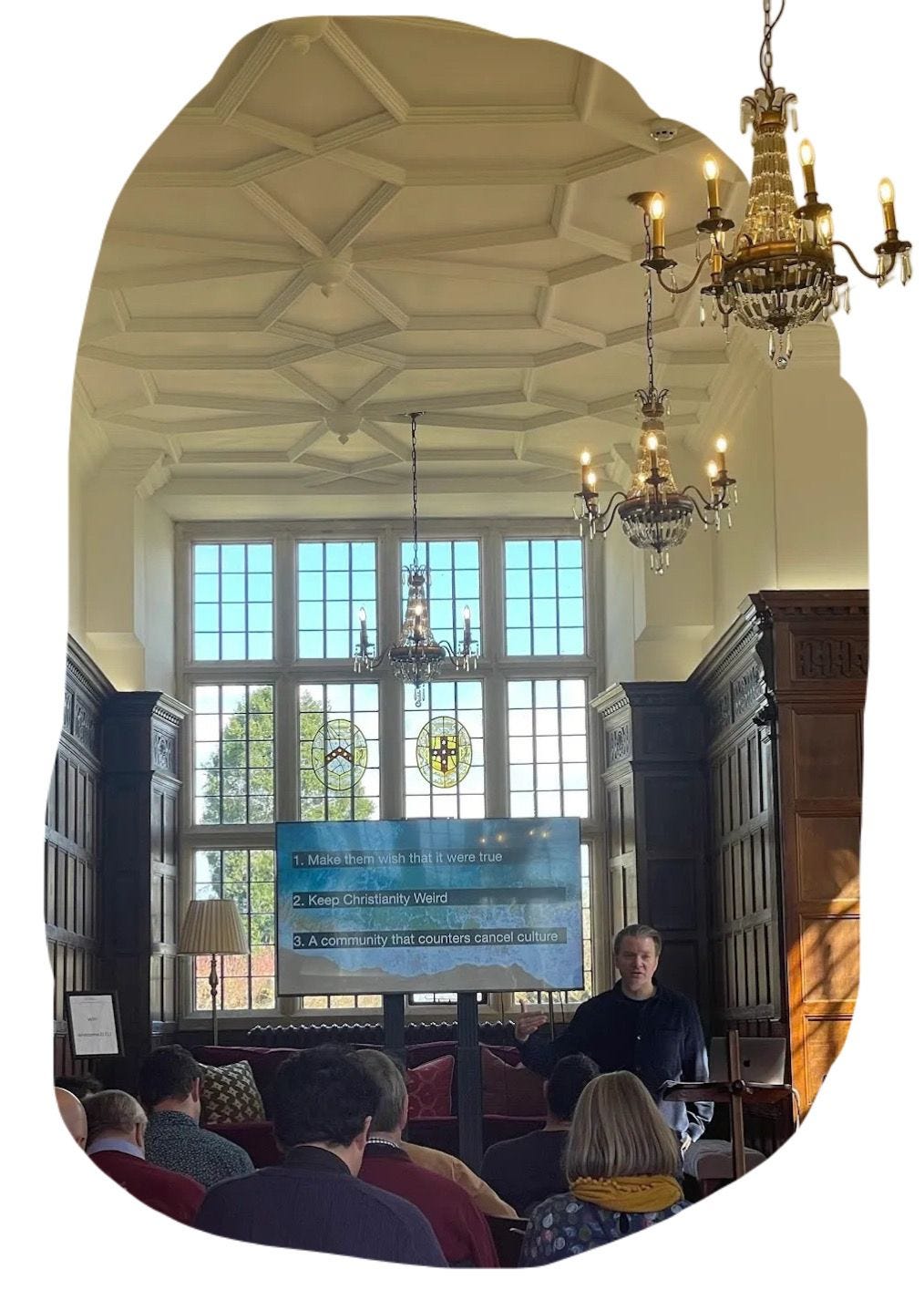


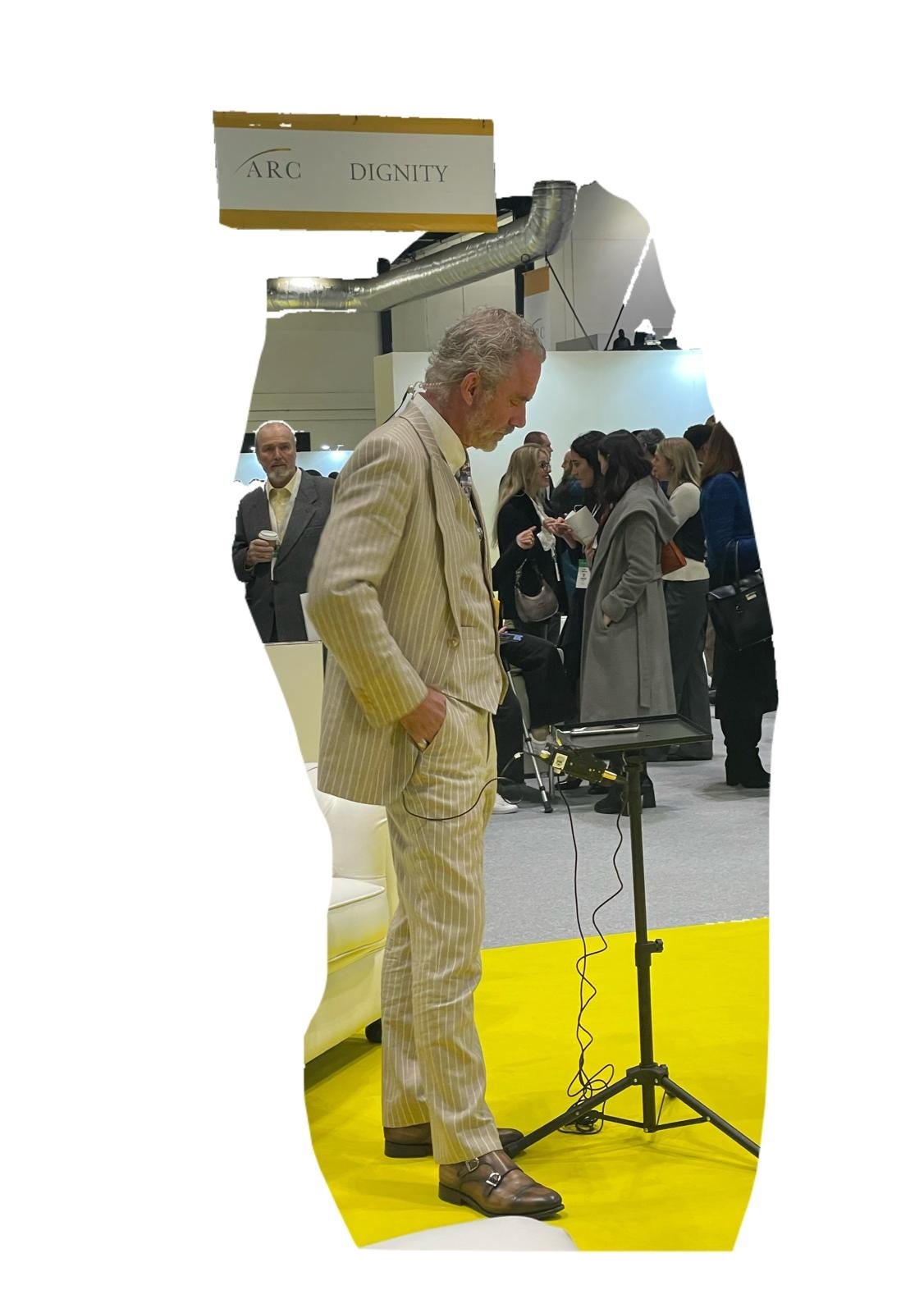
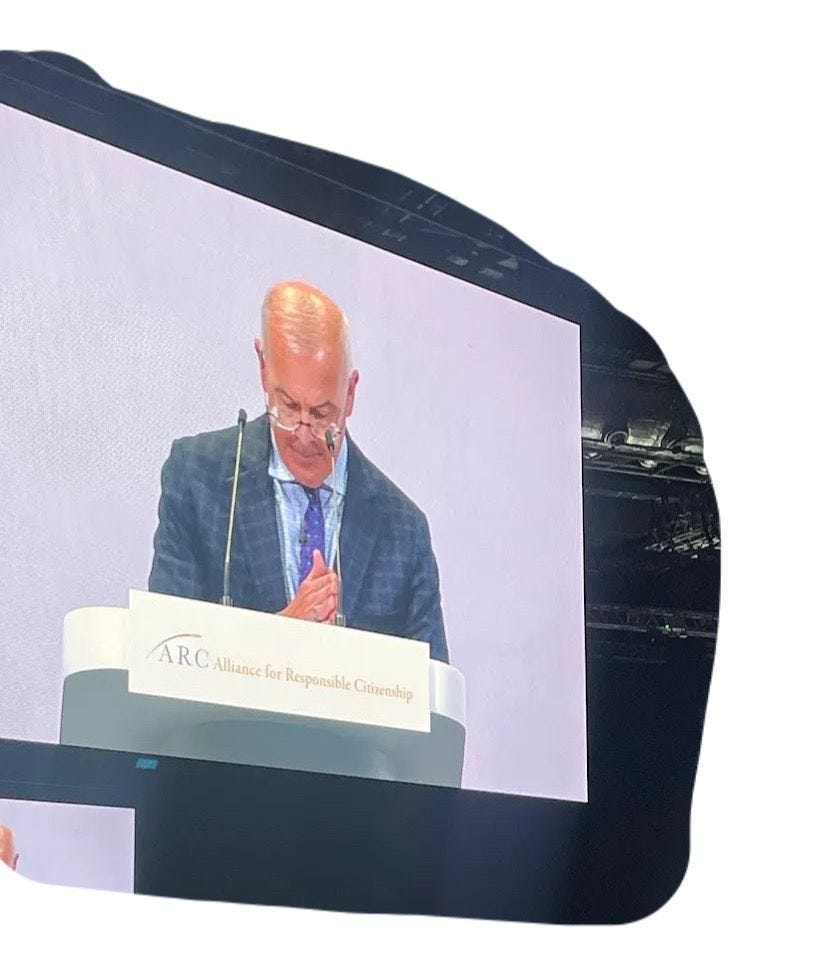





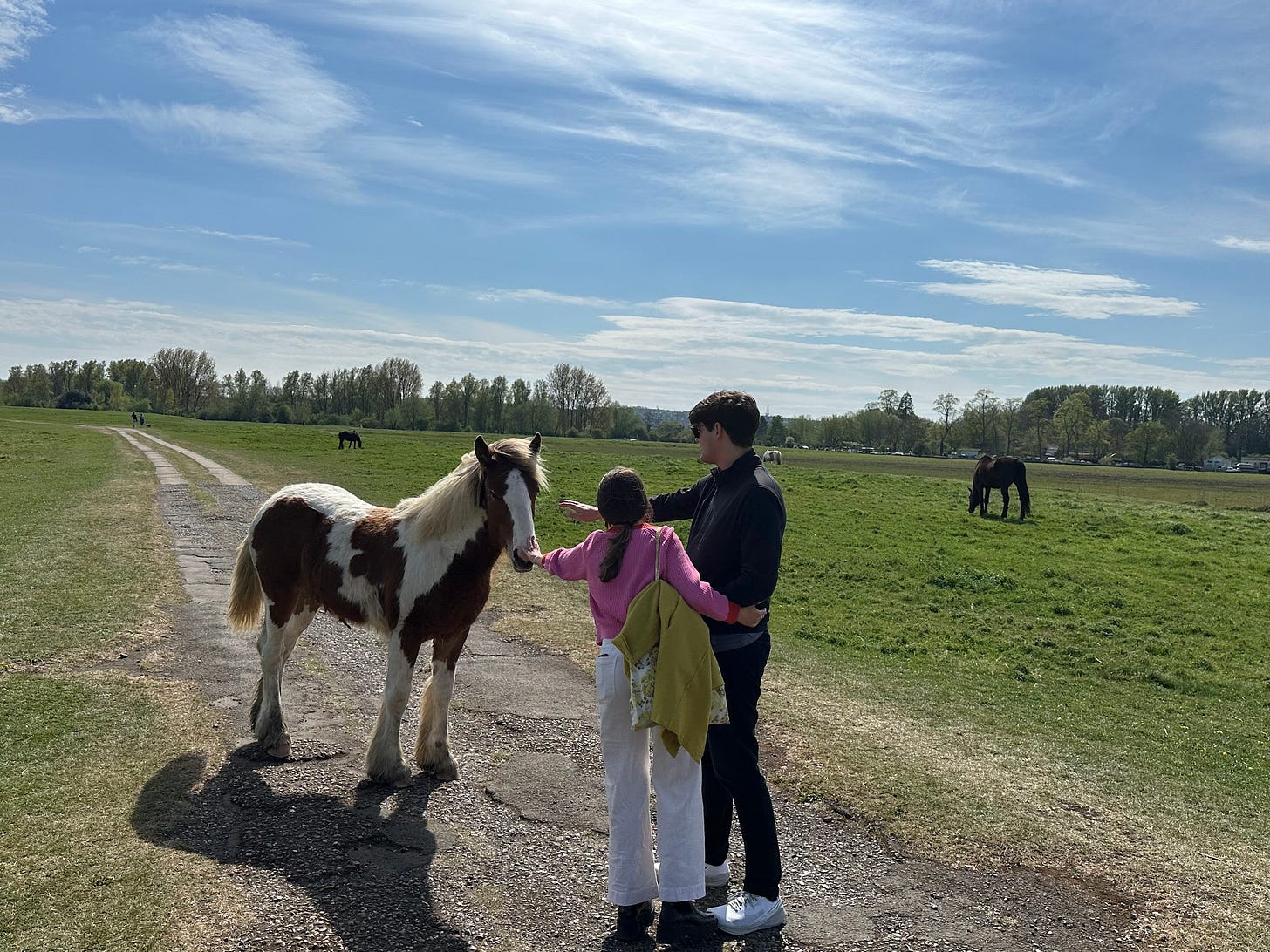




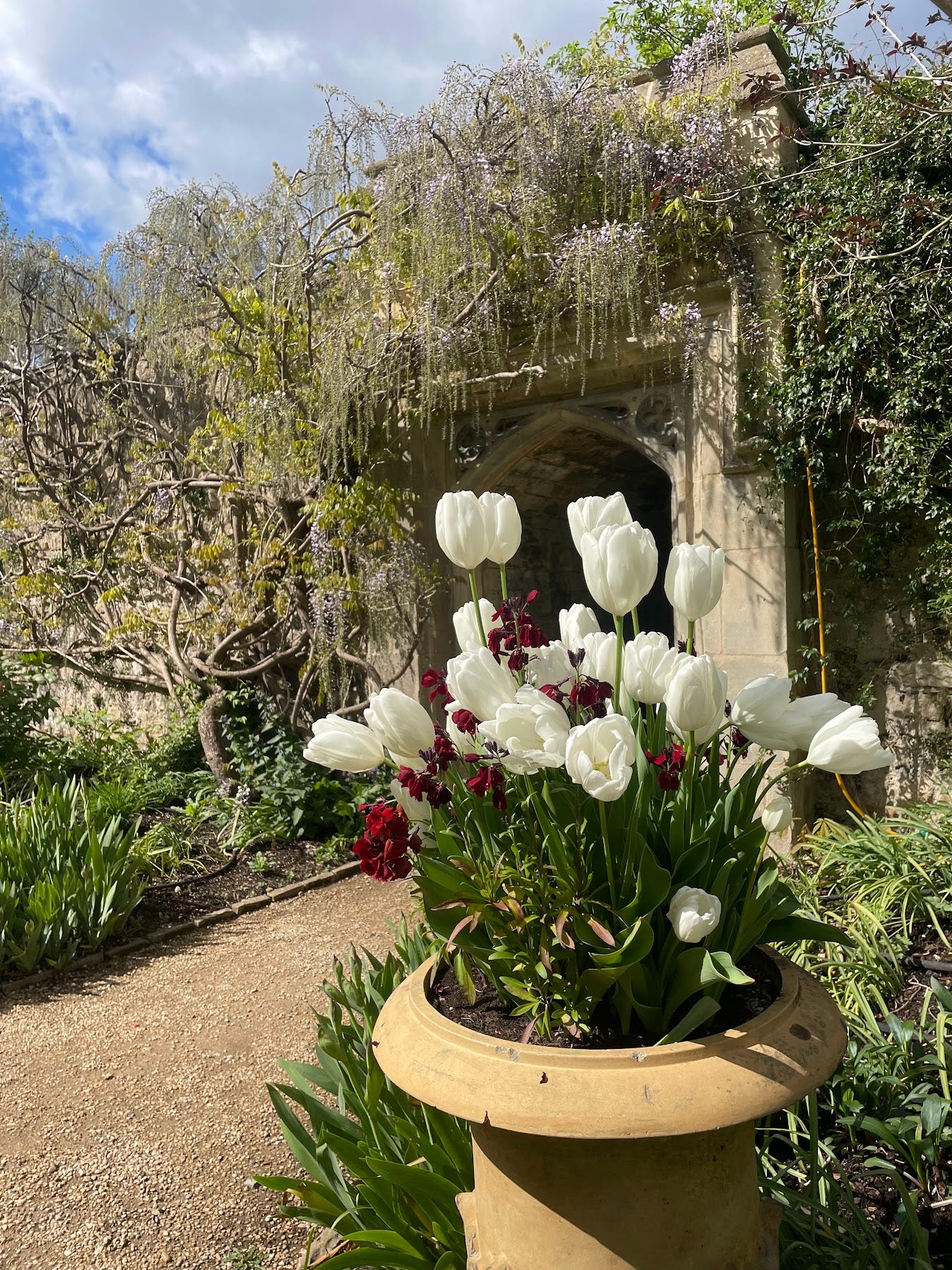
Lol make each of these points a post, pls
Re point #9: as an American Evangelical I feel the dearth of religious traditions, especially ones that can connect generations together. My country is too enamored of the idea of individualism. My wife and I have been tentatively experimenting with more deliberate customs and traditions with our kids, but it's hard to make something brand-new feel as though it's worth perpetuating for years to come; besides, anything we do is confined to the small sphere of our own nuclear family unless we put serious effort into getting it accepted by our friends and relatives. That being said, everything you describe is very encouraging.
This is tangential, but have you read Tara Isabella Burton's book "Strange Rites: New Religions for a Godless World"? She describes the growing move away from a blatant secularism and towards a more "re-enchanted" worldview, mostly among people who would never consider themselves aligned with Christianity in any way. What you describe sounds like what she describes, but with the difference that everything you see is happening within the context of Christianity. It's a very good book!